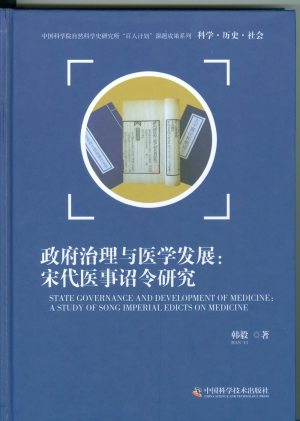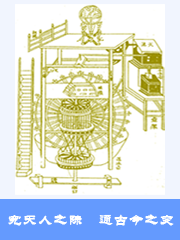- State Governance and Development of Medicine:A Study of Song Imperial Edicts on Medicine
Han Yi, State Governance and Development of Medicine│A Study of Song Imperial Edicts on Medicine. Beijing: China Science and Technology Press, 2014.

In pre-modern China, medicine was regarded as a kind of benevolent governance and drew serious attention from emperors and governments. The development of medicine was mainly embodied in medical imperial edicts, whose formulation, release and execution reflected the will and choice of the country. By taking medical imperial edicts in the Song dynasty as its research object, the book discusses the policies, measures and achievements of the government in medical aspect.
The government in the Song dynasty took positive attitudes towards medicine and issued 2813 medical imperial edicts, which was not only large in number but also rich in content. The government organized lots of medical activities in the following fields: the collation of previous medical literature, the writing of new medical books, the research and casting of bronze acupuncture status▏the response to major infectious diseases, production and sale of patent medicine, the management of oversea aromatic drug, the establishment and management of medical institutions, the specialization and development of medical education, the selection and assessment of medical officers, the application of doctrine of five evolutive phases and six climatic factors, as well as the control and reform of witch doctors. Medical imperial edicts not only provided law guarantees and policy basis for national medical development, but also got many prominent achievements in medical fields.
Under the state governance, Song dynasty medicine, in a leading position in the history of pre-modern Chinese medicine, had experienced important developments, and enjoyed significant innovations and achievements, which can be reflected in the following aspects: 1) established a relatively complete system of medicine and medical development environment; 2) set up lots of medical institutions and formed a large scale medical research teams; 3) greatly improved the medical research level and innovative ability; 4) made a breakthrough in design and manufacture of acupuncture bronze figure; 5) benefitted common people; 6) spread official medicine to surrounding areas, and had great impacts. There was a strong relationship between the government and the development and innovation of medicine. The trend of specialist and refinement appeared in medical research and application.
This book, using the theories and methods of social history of science, puts focus on the medicine which has close relationship with benevolent governance and the state government, then discusses its development under the support and management of the government. It not only enriches the view of scientific history study, but also expands the content of medical history study; therefore, it has a certain reference value.




